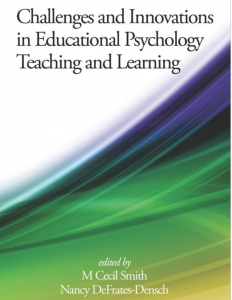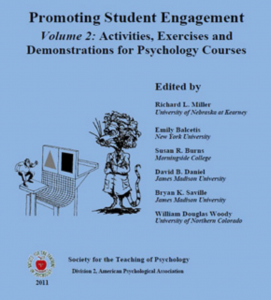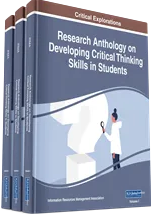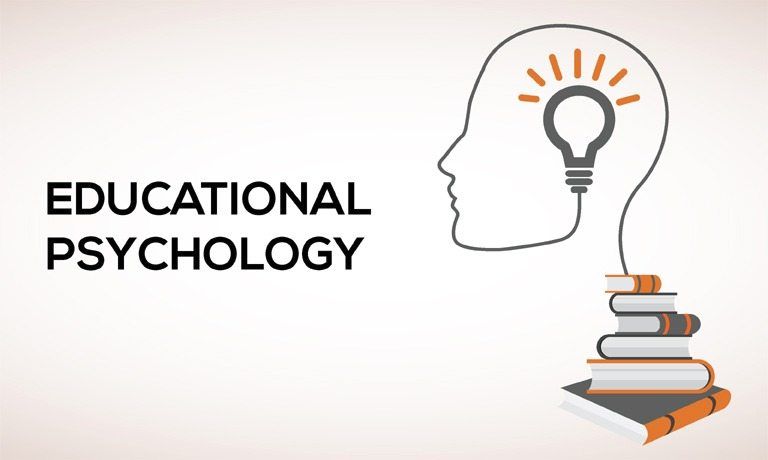 In more than 100 peer-reviewed journal articles, books, and book chapters, I have explored effective pedagogical approaches to instruction in K-12 education. Click here for my current vitae: CV.2026
In more than 100 peer-reviewed journal articles, books, and book chapters, I have explored effective pedagogical approaches to instruction in K-12 education. Click here for my current vitae: CV.2026
Specifically, I investigate cognitive and elaborative processes, the efficacy of instructional strategies, and moral development in elementary and middle school populations. Furthermore, as evidenced by publishing and presenting research with more than 25 undergraduate and graduate students, I strongly believe in mentoring students through the research process of help shape future leaders in psychology and SoTL research.
I am currently taking on student researchers in this lab. Please contact me if you are interested in becoming a student researcher @ [email protected].
Ed Psych Book
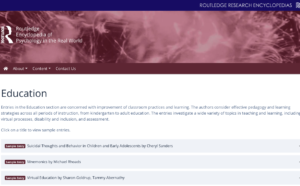 Gurung, R. A. R., & Richmond, A. S. (Eds.) (2023). Encyclopedia of psychology in the real world: Education. Routledge.
Gurung, R. A. R., & Richmond, A. S. (Eds.) (2023). Encyclopedia of psychology in the real world: Education. Routledge.
Recent Ed Psych Book Chapters
- Bernhardt, P. E., & Richmond, A. S. (2021). Promoting critical thinking through the use of student generated case studies. Research anthology on developing critical thinking skills in students (pp. 1-10). IGI Global. https://doi.org/10.4018/978-1-7998-3022-1.ch050
- Bernhardt, P. E., & Richmond, A. S. (2019). Promoting critical thinking through the use of student generated case studies. In the G. J. Mariano & F. J. Figliano (Eds.) Handbook of research on critical thinking strategies in pre-service learning environments (pp. 438-447). IGI Global.
- Richmond, A. S. (2016). Teaching learning strategies to pre-service educators: Practice what we preach! In M. C. Smith, & N. DeFrates-Densch (Eds.). Challenges and innovations in educational psychology teaching and learning. Hershey, PA: IGI Global.
- Richmond, A. S. (2011). Is your educational psychology class boring? A review of teaching methods to engage your student. In R. L. Miller, E. Balcetis, S. R. Burns, D. B. Daniel, B. K. Saville, & W. D. Woody (Eds.), Promoting student engagement (Vol. 2, pp. 83-88). Retrieved from the Society for the Teaching of Psychology Web site: http://teachpsych.org/resources/e-books/pse2011/index.php
- Richmond, A. S., Aberasturi, S., Aberasturi, R., & DelVecchio, T. (2009). Validity of the DIBELS Oral Reading Fluency test. In M. R. Pierson, K. K. Stang, & B. Varner (Eds.). Sound instruction: Ready to use classroom practice Vol. II. (pp. 74-77). Stuyvesant Falls, NY: Rapid Intellect Group. Retrieved from http://www.rapidintellect.com/AE/SOUNDINSTRUCTIONvolumeTWO.pdf
Recent Ed Psych Publications
- Schraw, G., & Richmond, A. S. (2022). Using visual displays to improve classroom thinking. Educational Research: Theory & Practice, 33(2), 80-102. chrome-extension://efaidnbmnnnibpcajpcglclefindmkaj/http://www.nrmera.org/wp-content/uploads/2022/05/06-Schraw-Richmond_2022.pdf
- Lee, A. A., Fleck, B., & Richmond, A. S. (2021). Exploring relations of academic self-handicapping and achievement goals among urban, underrepresented minority, middle school students. Educational Research: Theory and Practice,32(2), 79-105. Retrieved from http://www.nrmera.org/wp-content/uploads/2021/05/5-Lee-et-al-Exploring-the-Relations.pdf
- Gutierrez de Blume, A. P., Schraw, G., Kuch, F., & Richmond, A. S. (2021). General accuracy and general error factors in metacognitive monitoring and the role of time in predicting metacognitive judgments. CES Psicología, 14(2), 177-206. https://doi.org/10.21615/cesp.5494
- Gutierrez, A., Schraw, G., Kuch, F., & Richmond, A. S. (2016). A two-process model of metacognitive monitoring: Evidence for accuracy and error factors. Learning and Instruction, 44, 1-10. doi:10.1016/j.learninstruc.2016.02.006
- Sperling, R., Ramsay, C. M., †Reeves, P. M., †Follmer, D. J., & Richmond, A. S. (2016). Supporting students’ knowledge construction and self-regulation through the use of elaborative processing strategies. Middle School Science Journal, 47, 25-32. doi:10.1080/00940771.2015.1135099
- Fleck, B. K., Richmond, A. S., †Sanderson, J., & †Yacovetta, S. (2015). Does pedagogical documentation support maternal reminiscing conversations? Cogent Education, 2, 1-18. doi:10.1080/2331186X.2015.1124824
- Richmond, A. S., †Rauer, H. M., & †Klein, E. (2015). How does metacognition predict beliefs in psychological and educational misconceptions? The Researcher, 27, 20-24. Retrieved from http://www.nrmera.org/PDF/Researcher/Richmond.et.al.2015.Vol27.Issue1.pdf
- Schraw, G., Kuch, F., Gutierrez, A., & Richmond, A. S. (2014). Exploring a three-level model of calibration accuracy. Journal of Educational Psychology, 106, 1192-1202. doi:10.1037/a0036653
- Sperling, R., Richmond, A. S., †Ramsay, C. M., & †Klapp, M. (2012). The measurement and predictive ability of metacognition in middle school learners. Journal of Educational Research, 105, 1-7. doi:10.1080/00220671.2010.514690
- Cummings, R. E., Maddux, C. D., Richmond, A. S., & Cladianos, A. (2010). Moral reasoning of education students: The effects of direct instruction in moral development theory and participation in moral dilemma discussion. Teachers College Record, 112(3), 621-644.
